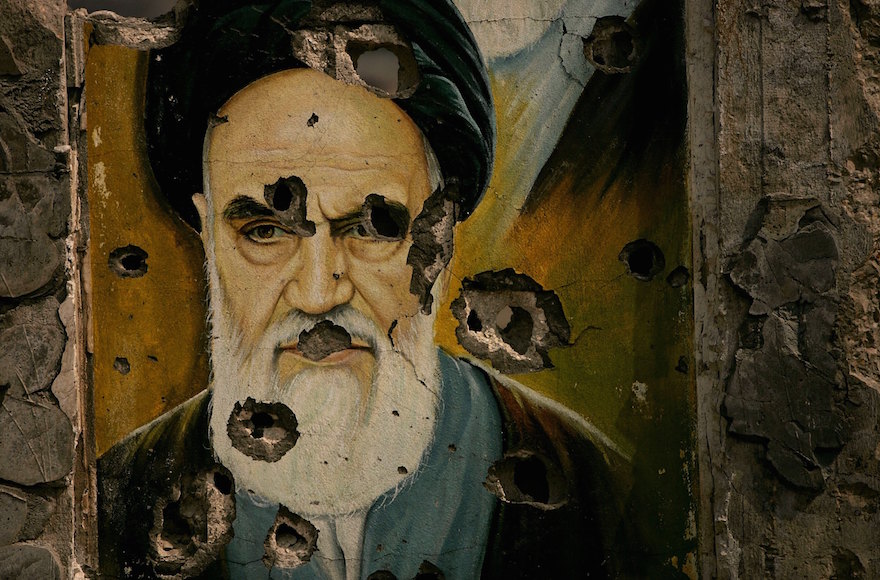In Europe, worried Iranian expats warn mullahs can’t be trusted
Published July 16, 2015

A bullet-ridden picture of Ayatollah Ali Khamenei in Lebanon in 2006: From the safety of Europe, Iranians paint the regime as ruthlessly self-serving. (Spencer Platt/Getty Images)
Thinking of his native Iran brings professor Afshin Ellian a mix of pain and pleasure.
Under police protection for his vocal opposition of Islamist extremism, Ellian feels the pain of millions languishing under the Islamic regime and Western sanctions that he views as consequences of the regime’s warmongering.
But Ellian — a law professor at Leiden University and a celebrated writer in the Netherlands — also has loving memories of the country he fled on camelback at the age of 18 with help from fellow liberal dissidents who risked their lives to save his during the 1979 Iranian Revolution.
That divided mentality, shared by millions of Iranians living in Europe, is behind the mixed reactions many of them had to the final agreement reached on Tuesday on Iran’s nuclear program, which offers Tehran sanctions relief in exchange for some scaling back of its particle-level activities.
In his first public comment on the deal, Ellian opposed its terms and said that Tehran played the West like a harp.
“The Ayatollahs saw and see Western media as useful idiots, just like during the Iranian Revolution,” he wrote on Twitter (in Dutch) as news that the deal had been agreed upon broke.
Ayatollahs zagen en zien in de westerse media de nuttige idioten, precies zoals tijdens de Iraanse revolutie #IranTalksVienna @Elsevier
— Afshin Ellian (@AfshinEllian1) July 14, 2015
Ali Kheradpir, an Iranian journalist who fled that country in 2010 and now works for EuroNews as their reporter in London, focused on what the deal means for the Iranian people, rather than for their government. Iran’s nuclear activities, he wrote, have resulted in “lots of tough financial and economic sanctions.” With the deal reached, he said, “many Iranians across the world hope that the economic pressures on the people inside Iran will be reduced.”
But Ellian argued that the deal also means more suffering for Iranians. “This accord also jeopardizes the Iranian people as it provides broad international legitimacy to the ayatollah regime, which will now have more money to oppress its own people,” Ellian wrote (in Dutch) in an op-ed published Wednesday in the online edition of the Netherlands’ Elsevier weekly.
In the same op-ed, titled “Nuclear agreement is only temporary, partial ceasefire,” Ellian also noted some Iranians’ less benign hopes. Referring to mass demonstrations last week across Iran, Ellian wrote: “While the ayatollahs say they seek peaceful means, they shout, “Death to Israel, death to America’ in Tehran.”
Ellian expressed skepticism about Iran’s commitment to the agreement, citing opposition to its terms by Ayatollah Ali Khamenei, the country’s supreme spiritual leader.
Last month, Khamenei toughened his previous “red lines” on the deal, which went ahead despite them. After the deal was reached, he said he neither opposed nor supported it.
But on June 23, Khamenei’s official website reported he opposed long-term commitments to limit Tehran’s nuclear program, like those Iran agreed to in the deal. He also rejected inspections such as those Iran consented to.
These concessions by Iran — and perhaps by Khamenei — failed to convince Maryam Rajavi, another Iranian dissident and the France-based leader of the National Council of Resistance of Iran, of Tehran’s sincerity. Still, she said they made her hopeful, because she believes they exposed weakness within the regime’s hardcore.
“Circumventing six UN Security Council resolutions, an unsigned agreement, will not close the mullahs’ path to deception and access to nuclear bomb, but the Chalice of Nuclear Poison and Khamenei’s retreat from his redlines will shatter his hegemony and undermine the entire regime,” she tweeted on Tuesday.
#IranDeal #IranTalks #Iran pic.twitter.com/Qirr5firhp
— Maryam Rajavi (@Maryam_Rajavi) July 14, 2015
This entry passed through the Full-Text RSS service – if this is your content and you’re reading it on someone else’s site, please read the FAQ at fivefilters.org/content-only/faq.php#publishers.














